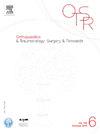GeneXpert® MRSA/SA SSTI 检测在假体周围关节感染中的应用:失败率、结果和风险因素。
IF 2.2
3区 医学
Q2 ORTHOPEDICS
引用次数: 0
摘要
背景:问题/目的:(1)GeneXpert® MRSA/SA SSTI 检测结果假阴性的比例是多少?(2) GeneXpert® MRSA/SA SSTI 检测结果假阴性是否会增加 PJI 患者治疗失败的风险?(3)出现假阴性结果的风险因素有哪些?我们开展了一项回顾性研究,对2012年4月1日至2016年10月1日期间假体关节感染中的所有GeneXpert®检测结果与传统培养结果进行了比较。研究发现了假阴性(FN)结果(GeneXpert®检测中未检出耐甲氧西林葡萄球菌(MRS),但培养中检出)。我们比较了 FN 结果和其他检测结果的治疗失败率,并确定了出现 FN 结果的风险因素:在 612 项 GeneXpert® 检测结果中,出现 FN 结果的比例为 3.6%(22/612)。我们发现,与其他检测结果中的 198 次治疗失败(198/590)相比,出现 FN 结果的假体关节感染治疗失败次数明显增加,有 14 次治疗失败(14/22)(OR, 2.1; 95 % CI, 1.3-3.4, p = 0.0019)。在不将抑制性抗生素视为治疗失败的情况下,我们发现假阴性检测结果与其他检测结果的治疗失败率没有明显差异(OR,1.36;95 % CI,0.66-2.81,p = 0.41)。吸烟(OR,3.8;95 % CI,1.4-10.3,p = 0.004)、ASA 分级(OR,2.4;95 % CI,0.9-6.9,p = 0.064)、关节感染史(OR,3.2;95 % CI,1.2-9.6,p = 0.007)、慢性感染(OR,3.2;95 % CI,0.8-17.5,p = 0.01)和多微生物感染(OR,3.2;95 % CI,1.1-9.2,p 结论:假体关节感染中的 GeneXpert® 检测显示 FN 结果的比例较低。只有将长期使用抑制性抗生素视为治疗失败时,才会观察到 FN 结果增加了治疗失败的风险:证据等级:III;诊断性回顾性病例对照研究。本文章由计算机程序翻译,如有差异,请以英文原文为准。
Performance of the GeneXpert® MRSA/SA SSTI test in periprosthetic joint infections: rate of failure, outcomes and risk factors
Background
The GeneXpert® MRSA/SA SSTI test allows early detection of methicillin-resistant staphylococci in intraoperative samples of prosthetic joint infections (PJI) in order to stop early broad-spectrum antibiotics.
Questions/Purpose
(1) What is the rate of false-negative GeneXpert® MRSA/SA SSTI test results? (2) Does a false-negative GeneXpert® MRSA/SA SSTI test result increase the risk of treatment failure for the patient with a PJI? (3) What are the risk factors of a false-negative result?
Method
A retrospective study was carried out to compare all GeneXpert® assays to conventional cultures in prosthetic joint infections from April 1st, 2012 to October 1st, 2016. False-negative (FN) results (absence of methicillin-resistant staphylococci (MRS) with GeneXpert® test, but presence in the culture) were identified. We compared the rate of treatment failure between FN results and other test results and we established the risk factors of having a FN result.
Results
Among the 612 GeneXpert® results, the rate of FN results was 3.6 % (22/612). We found a significant increase in treatment failures for prosthetic joint infection with a FN result with 14 treatment failures (14/22) compared to 198 treatment failures (198/590) in the other test results (OR, 2.1; 95 % CI, 1.3−3.4, p = 0.0019). Not considering suppressive antibiotics as a treatment failure, we found no significant difference in the rate of treatment failures between the false-negative tests and the other tests (OR, 1.36; 95 % CI, 0.66–2.81, p = 0.41). Tobacco use (OR, 3.8; 95 % CI, 1.4−10.3, p = 0.004), ASA classification (OR, 2,4; 95 % CI, 0.9−6.9, p = 0.064), history of infection in the joint (OR, 3.2; 95 % CI, 1.2−9.6, p = 0.007), chronic infections (OR, 3.2; 95 % CI, 0.8−17.5, p = 0.01) and polymicrobial infections (OR, 3.2; 95 % CI, 1.1−9.2, p < 0.0001) were risk factors for a FN result.
Conclusion
GeneXpert® tests in prosthetic joint infections showed a low rate of FN results. An increased risk of treatment failures was observed in FN results only when long-term use of suppressive antibiotics was considered as treatment failure.
Level of evidence
III; Diagnostic retrospective case control study.
求助全文
通过发布文献求助,成功后即可免费获取论文全文。
去求助
来源期刊
CiteScore
5.10
自引率
26.10%
发文量
329
审稿时长
12.5 weeks
期刊介绍:
Orthopaedics & Traumatology: Surgery & Research (OTSR) publishes original scientific work in English related to all domains of orthopaedics. Original articles, Reviews, Technical notes and Concise follow-up of a former OTSR study are published in English in electronic form only and indexed in the main international databases.

 求助内容:
求助内容: 应助结果提醒方式:
应助结果提醒方式:


